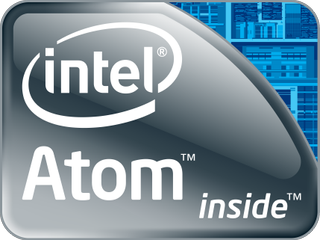Intel Pushes Atom CPU to Drive Storage Devices
The Atom to help you serve files.

While Intel's Atom has a near-monopoly on the netbook market, that's not the only place the processor will be practicing its power-miserly ways. Intel launched at CeBit its first Atom processor-based platform optimized for networked home and small office/home office (SOHO) storage devices.
The energy-efficient platform consists of the Atom processor D410 single-core or D510 dual-core and the 82801IR I/O Controller to run network-attached storage (NAS) devices that organize, manage, protect and share documents, photos, videos and music.
The new platform features six PCI Express lanes, 12 USB 2.0 ports, a port multiplier function and eSATA ports that give OEMs the ability to add peripheral devices and expand storage capacity outside of the box. It also features hot plug capabilities for easy capacity upgrades and an integrated gigabit Ethernet MAC controller for improved data transfers to and from the home server or small office NAS device.
"NAS systems have traditionally been found in businesses to manage, store and access data," said Seth Bobroff, general manager, Intel Data Center Group, Storage. "Today, households and small offices have an ever-increasing number of computers, laptops, netbooks and mobile phones that create and consume digital content. This advancement in mobility coupled with the explosive growth of data and media are creating the need for centralized, easy-to-use network storage solutions for the home and small office."
LaCie, LG Electronics, QNAP, Synology and Thecus are signed on as product partners for Intel's platform.
Stay On the Cutting Edge: Get the Tom's Hardware Newsletter
Get Tom's Hardware's best news and in-depth reviews, straight to your inbox.
-
industrial_zman yeah! now we can hack our nas boxes without cross compiling. mmmmmm a self sufficient torrent slave box ;) .... errr I mean a personal hidden porno web server .... doh! one more time, to help reduce processing cycles on the servers for backups and automate them through the nas. yeah, that one works.Reply -
cadder I've seen relatively inexpensive NAS devices, but they are slow when compared to a full blown Linux fileserver. Does the atom allow the low priced devices to approach the speed of a full blown fileserver?Reply -
palladin9479 Why the well would anyone want to use an Atom when they could instead use a Via Nano? Its cheaper, faster and best of all has AES-128/256 encryption built into the damn CPU. Very hand for file / network encryption.Reply -
palladin9479 Wow I completely fail at spell checking.Reply
I meant to say, why would anyone want to use an Atom when they could use a Via Nano for the same task at hand. The Nano's are faster, cheaper and have lower power requirements (system wide). Their onboard AES encryption is faster then anything present, including current quad core systems. This makes these CPU's the ideal candidate for storage / network services, especially if real time encryption is required. -
sabot00 fancarolinaHow long before we see an Atom in a Smartphone?Till Qualcomm's 1GHz SnapDragon isn't good enough and they aren't making a newer one.Reply -
JohnnyLucky I went to Fry's Electronics yesterday. There were several Atom based motherboards on display. I also looked at some new small form factor cases and a couple of NAS cases. I'm having a hard time trying to imagine several small boxes sitting on my desk instead of one mid-tower case.Reply -
Shadow703793 palladin9479Wow I completely fail at spell checking.I meant to say, why would anyone want to use an Atom when they could use a Via Nano for the same task at hand. The Nano's are faster, cheaper and have lower power requirements (system wide). Their onboard AES encryption is faster then anything present, including current quad core systems. This makes these CPU's the ideal candidate for storage / network services, especially if real time encryption is required.There are i5s with built in AES acceleration. I can't remember the model numbers, but they do beat the Via'sReply
Most Popular





